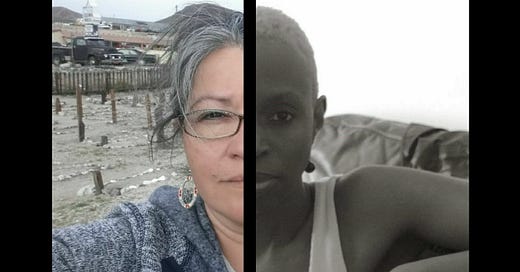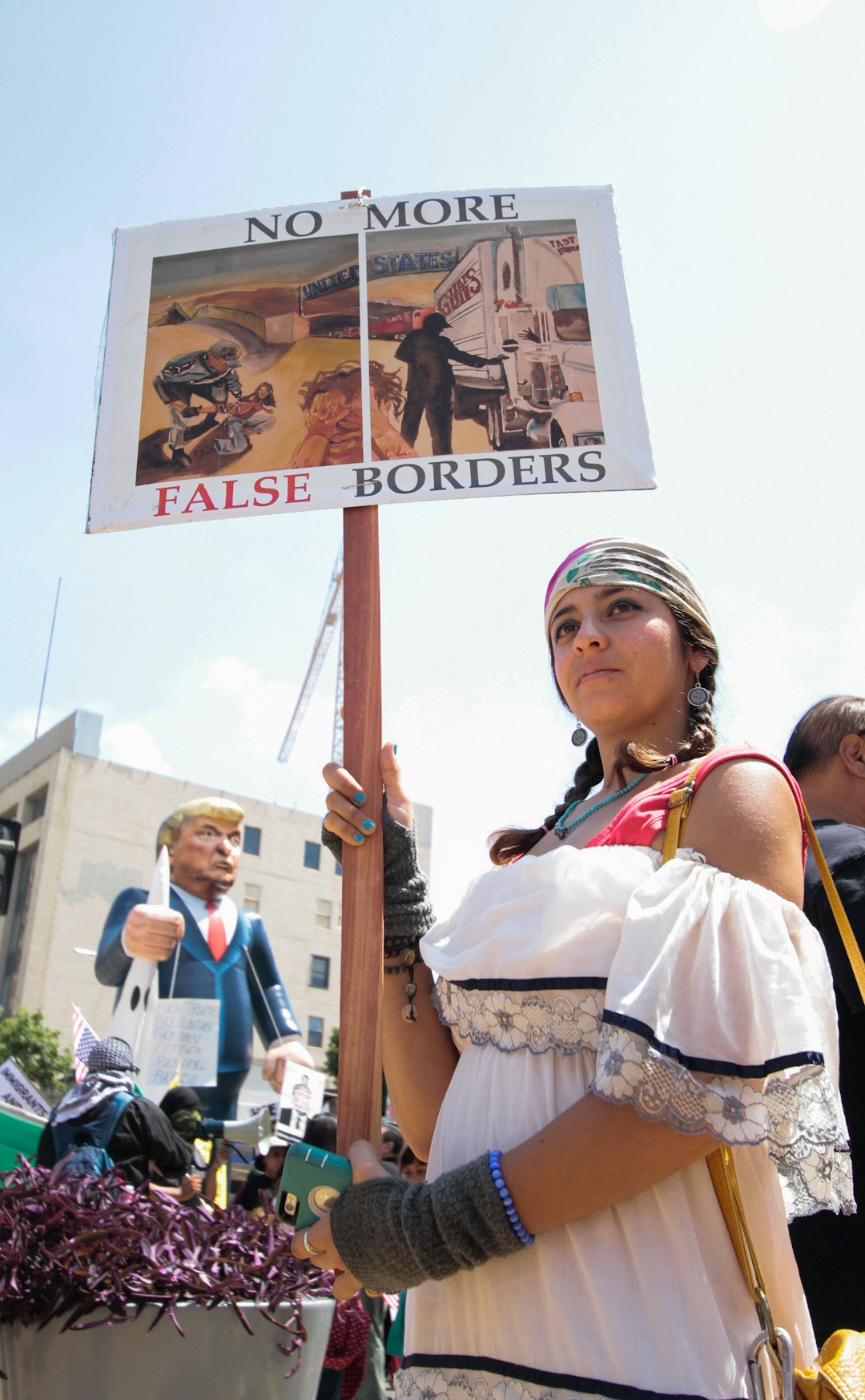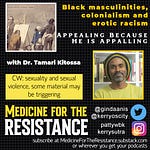Colonialism is a total regime, it is not a system or a way of thinking. It is a regime that articulates itself differently on different bodies but it has the same goal. The subjugation of those at the edges. Dr. Tamari Kitossa joins us to talk about the construction of the Black male, about criminology as a tool of colonialism, and how patriarchy is used to control all of us, not only women.
Tamari: I'm a professor at Brock University been there for, I'm now going into my 14th year. I'm an associate professor. I got my PhD from OISE at UofT. Interesting thing about OISE is that just about when I was graduating at about 2004/2005 they were absorbed into U of T. Up until that time; it was the brainchild of Premier Bill Davis. I think always OISE was opened in the late 60s, early 70s. And so OISE was really this amazing place where people on the left immigrant people, advocates, activists, they could congregate at OISE as a space for engaging in real serious knowledge production. But now it's been absorbed into U of T. I think they're still doing amazing work at OISE, so it’s a place that I love and Respect. And so I think very highly of and prior to that, my MA, my magisteria and my honors were at York University in Toronto.
So I'm an immigrant kid. We came here in the 1970s, 1973 from Jamaica. So I'm an immigrant kid to Canada, still very much in my head an immigrant working class kid. So being in this space is still new to me and I'm learning continually how to navigate it.
Kerry: We're of Caribbean descent, and we move forward and flowed onwards in came into this land, this colonial space of whatever we want to call it. So the idea of being an immigrant kid resonates with me as well. Yeah. And what for you, I have a question on that, that comes to mind is how did you find even just the experience of being an immigrant kid, I’m not sure when you arrived how old you were, but coming up in the Canadian system like with the Canadian school system, the ideals of being Canadian, and yet still having the backdrop of our very West Indian roots and parenting?
Tamari: You know, it's an interesting question. I actually wrote about that in a book on the 50th anniversary of Jamaica's Independence, Carl James and Andrea Davis edited a collection. And I wrote about my experience, because I was part of a generation of children who … like I was raised by my grandmother, and then my grandmother basically said to my parents, you can't take his other siblings without taking him. So I was slightly different from the quote unquote barrel children, whose principally their mothers, either as the Domestic Workers or live in workers, immigrated to Canada before them and then sent remittances and so forth through their children back home. And then when they were able to bring their children to Canada, they did bring them to Canada. So what I wrote about was that imagining what it was like in the Jamaican village, between 1965 and 1985, where progressively it was simply emptied of the many of the children. Right, so the elders, you know, witness to the silencing of children's voices or the decreasing of those voices and it made me think about African villages where Slave Hunters went in and just denuded the villages of children, right? and the able bodied and the strong bodied and left many of the seniors there simply looking about and not hearing the voices of children.
So my experience I, that connected me to that that part of my ancestry because I am mixed, that African side of me. So when I got here, it was really a shock. Because at the time, the educational system in the Caribbean was very much the English Commonwealth system and people still took the exams issued from London. And so for all intents and purposes, we were way ahead of the kids here when we immigrated. But because some of us spoken patois, right? just merely the sound, our intonation, our inflection, was the reason why some of us like me were put back a grade just merely just here we did. I spoke out put back a grade. It was it was a really jarring experience just coming from a space where you are huddled, you were held, you were loved. That's not to say that you they weren't ass whippings and abuse, they were definitely that there's no question about it. But it was a much more complicated space where you were a whole person, it was a whole complex environment to now a space where really was a single narrative about who you were who you are this this nigger this skidmark and that was a part of my upbringing, my that psychological terror of literally been terrorized by adults and children alike, not all, but enough to leave me with a lasting impression.
Kerry: Well, I got to take a deep breath into that one.
Patty: I'm hearing residential school.
Kerry: Right? And honestly, it's, it's interesting how you can bring those these three occurrences in between We even in how, you know, as Indigenous have felt and come in, and their assault.
Tamari: I think Patty identified it very well. And that colonialism is a total system. It's a total regime. I don't like the idea of a system because we've never seen one. We’ve only seen relationships. But there are these very stark parallels, because the way that colonialism articulates itself within one national territory, it articulates itself differently for different people. But if we look, with open eyes, pretty much as Patty saying, we can see these parallels, and we can see in them the capacity to develop relationships and build alliances.
Patty: That's so interesting.
Kerry: Yeah. And isn't that that's something that we talk about,
Tamari: Because in fact, one of the things that I point out in that essay is many of us who come from the hills in Jamaica, those communities were either trading points or on the routes or the trails created by the by the Caribs, people in Jamaica. So there was a whole route network from the inland to the coast, where the indigenous peoples of Jamaica, either lived, traded, went to hunt, fish, do a number of things. And so, my African ancestors and again, I want to emphasize this that that Jamaica is ultimatly many people I've got the English, the indentured Indians. I've got, you know, English ancestors who lived up in the hills in Jamaica who marry Indian or South Asian women. And you got to ask yourself, How the hell did that happen in the 1800s, where you got some English guy living up in the hills in St. Anne, right? So the way that colonialism has these tendrils that really brought people together in these complex and nuanced ways. But nevertheless, we're talking about an overlaying of patterns on existing indigenous cultures and ways of living pathways literally pathways where the my African ancestors cut the trip, cut most trails into roads, but they were laying on top of that indigenous substrate.
Patty: What's your field of study?
Tamari: My field of study sociology, and in particular, I have a couple areas of interest. One is interracial couples, as you might gather from what I've said about mixed heritage thus far. Two other primary areas is the sociology of knowledge. I'm interested in how we in groups come to construct ideas and how we know what is true, what is real, and how we come to believe certain things versus other things, because much of what we believe, or what we believe that we know, is really second-hand information. So how can we judge what we believe to be true because that shapes how we act in this world. Because much of what we know comes from other people comes from other sources. So we need to have ways of verifying the accuracy, the merits, and the veracity of those ideas. And the third area of research is following a guy in the UK named Stanley Cohen, is anti-criminology. So I'm in the criminology area in my department at Brock. And so I'm not simply on the margins of criminology, I'm actively an anti-criminologist because the question that I'm asking is, if criminology is explaining to folks how crime gets committed, how laws get created and how we react, both the law and the commission of crime, how do we explain the stealing of people's bodies and their labors, the stealing of their land? How does criminology explain colonial dispossession and genocide of the indigenous peoples, whether it's in Canada or anywhere else that was done by law, or literally the state is a criminal enterprise by its own terms?
Kerry: What brought you to that space? I'm now I'm fascinated to know what brought you when you were, you know, working through the the idea of getting your degree and getting your PhD what brought you into that stream of criminology.
Tamari: And so I'd love to answer the question. There's one point that I need to clarify. It is within the context of my focus on interracial couples, where my interest in part with Blackness and African men comes in, because part of the issue here is that interracial couples are always on the margin, they're always contravening and contradicting someone's conception of normalcy. That's how I'm interested in anti-criminology
I grew up in Toronto in the 80s, where if you pick up a copy of the Toronto Sun, the star, a Globe and Mail all that you saw were articles by Christy Blatchford, Michael Volpi and others, Rosie Dimanno, really assailing the African Canadian community, Jamaicans in particular with a focus on young black men. And so I wrote my dissertation on the media pedagogy of anti-blackness and crime, or the construction of crime, is so central to the dominant understanding of Blackness. And so that's how I came to my critique of criminology. I never entered criminology as an adherent, I always entered it as a rebel, always as an infidel, because I believe that it is very much a faith. And I think people need to take a step back and question, the dogma and the doctrine of criminology because we've never seen a criminal that looks any different from you, me or anybody else. So the question to me then is how do scholars end up theorizing about criminality as if it's objectively and ontologically real? Like, how does one do that? Right?
So there's this whole mystification taking place where we need to demystify it, and take a step back and see that isn't always necessary that law is the primary means of organizing civil society. Can we have other means and methods? And I think Indigenous cultures of the world over provide us with an alternative way of imagining how we can coexist with each other.
Patty: Well, because always whose laws right, right? It's whose laws because we had laws, we have laws, you know, the different nations have laws. So whose laws are they that are deciding what is right? It's the regime’s laws, it's those laws. And yeah, so I'm very interested in that because you know, I'm working on a project right now about how to how do we go forward as good relatives? How do we, because it's not under this current system of understanding and ways of relating to each other. That's not, it's not working, and it's not intended to work. It's only intended to disrupt and separate. So how do we go forward? So I'm super interested in what you're talking about. I'm just sitting here soaking it all in.
Kerry: We know that there has been added stigma attached in those spaces. And it's, it's been used in the system to allow for a hyper vigilance that comes against, our black men, do you know what I mean? I don't know if there's the underlays of, um, I’ve often read Dr. Francis Cress Welsing from the Isis Papers and her theories about how you know the Black man being the foundation being the absolute warriors and that there’s some, you know, threat that is taken on a subconscious, biological level, epigenetic level. But I'm curious to understand where did that fit in for you that space where you came into this idea of the inter relationship?
Tamari: In order to answer that question, I think I need to go deeper into your commentary on Francis Cress Welsing. When I was growing up in Toronto, many of us went to Third World Books. Leonard and Gwendolyn Johnson, that was a place where, if you were socialist, if you were an Indigenous Canadian person, that's what Third World books was literally third world of books like this was before the quote unquote, global south. So that was a place where you went to expand your imagination and your mind because those of us who went there had an intuitive sense that our intellectual horizons were being narrowed. And that there was something else that there was something more that there were other ways of connecting and thinking than what was being allowed to us in schools and media and so forth. And so that's where we had raucous debates about Francis Cress Welsing, Molefi Asante, Maulana Karenga, and others and Ivan van Sertima. We debated all those ideas alongside with Marx, Hegel, Foucault, you name it, Fanon, was all in the mix. So I was introduced to Francis Cress Welsing’s theory of Iceman Inheritance. And, sorry, that's Michael Bradley, Iceman Inheritance. That's another part of that of that genre. He's a white academic, but I found that stuff really intriguing until it got to the whole genetic part, and I found myself being troubled by the geneticist argument and orientation, but I didn't have enough reading behind me to help me explain why I was troubled by it.
And now that I have all of that reading behind me, I can see why I'm troubled by it. Because it ends up being racialist. I wouldn't say racist, but racialist because racially dominated people cannot be racist. They do not have the capacity nor the power to determine the life chances and outcomes for people in the dominant group. And so this is where I'm now thinking about race, racism, patriarchy, masculinity, misogyny, that what we're talking about is not individuals who are misogynist, not individuals who are racist, but a group dynamic. And this is where Fanon is helpful in understanding that when you're talking about racism, you are in fact talking about other relations of domination and in particular, we talk about race and you're talking about the competition and domination between males. We don't we don't like to think about patriarchy in these terms because we think that women are the primary objects of patriarchy. I'm here to suggest that yes, women are the one of the objects of patriarchy, what are the manifest objects of patriarchy. But there's a latent object to patriarchy, which we cannot see which is primary.
In order to dominate any woman, the first woman ever dominated by any man. The man dominating that woman had to go through her father, brother, uncles, all of her male relations. So, whether the male domination took place within a particular homogeneous cultural context, the dominating male had to go through dominating subordinate males in order to dominate all the women and the women that were aligned to that dominating male, those women could dominate subordinate males. So this notion that feminism has given us is really a patriarchal narrative. Right? It actually sustains patriarchy and male domination of men dominating other men, because we can never see that that's really what's happening. And that, for example, to dominate Indigenous cultures around the world, right? You have to dominate the warriors in that culture, who would defend and protect the interests of that group. And those men who are in alignment with their women. They were not not necessarily dominant over their women. They had a particular synergy or relationship with their women, where people played particular types of roles. When you come in and you disrupt that by dominating the males, then you can dominate the females. And I'm here to suggest that Francis Cress Welsing’s thesis is useful within a certain range But I parted company with her in terms of the whole genetic argument, we're talking about a cultural dynamic, a dynamic between groups.
Kerry: And I agree with you, um, I loved that she opened up some revolutionary spaces. The concepts are intriguing. But I to do understand I think our men, especially Black men, have been very much left out of the narrative. This this, we have painted our men or there's been this common sense in the feeling of how we exist, that they are simply either warriors and that they are you know, infallible, but to a degree that has not allowed them to show any vulnerability or they become menaces. And if there's never a space in between, and I can see how that would be advantageous in a patriarchal, or or colonial system to keep them in a certain mindset where there's no allowance for growth. There's no allowance for space to become.
Tamari: And this this has really significant implications for African Canadians. I don't know what the statistics are for the gender balances between Indigenous Canadian peoples. But when you look at the African Canadian communities, there are something like 80,000 more women or females than males. And part of this is, not a part, a significant amount of this has to do with immigration policy. So the immigration policies by and large are a feminized immigration policy, and the implication of that is that income disparities then become magnified in part because there are so many more women than men, and that therefore you have many more female headed households. Right?
So here's the dynamic where Black Canadian women, white Canadian women in general, the income disparity between them is not is not, there is an income disparity but it's not really major. Right? When you look at woman to woman in terms of education and socio economic status, right, you will find that if you are an African Canadian woman versus a white woman, regardless of your class, white women make more than Black women do. Right? But when you look at the income disparity between men, between white men and Black men, is something like 30% there's a 30% percent income penalty, like 22 to 30%. I've seen different statistics in I've seen one statistic for Latino Canadian males. And it's not clear whether there are Black or white Latino males, that data was not made clear, they suffer an income penalty of 38%. So every dollar that white man makes, they make 38 cents less. And for African Canadian males, they make 78 cents to every dollar that white men make.
So in terms of income disparity between men, you have a feminized or largely a woman centered population. Families tend to acquire and accumulate intergenerationally based on the male income. So if you have fewer males, greater income disparity between males, you will have communities that are living in greater poverty and destitution. And the same would apply for the Indigenous Canadian communities in terms of the relationship of income disparity between Indigenous Canadian males and white males. So we have these parallels, colonialism tends to be a coherent regime like that.
And so when we want to understand why some communities are really dealing with dire situations and conditions, right, some people want to go to the issue of its income disparity related to women, the answer is yes. But it's also the income disparity between men, between dominant males and males from the subordinate communities. So when we're talking so this is one way to understand those dynamics and why I'm really reluctant to go to geneticist arguments, it's it misses over so much of the complex sociological factors that are sitting right in front of us, and we can easily go through genetic explanations. But then, what's the solution in the final analysis to kill all white men, kill all white people? Is that what is that what’s going to equalize the terrain? That's where that argument goes by logic. And I don't I think that's highly problematic.
Patty: And I think it's dangerous to get into genetic arguments because that's a form of race science.
Tamari: Yes,
Patty: Creating inherent qualities within this group of people and within that group of people. It's, you know, it's race science, basically, that's what Linnaeus was doing back in the 1700s.
Tamari: Yes,
Patty: this group of people have these qualities, genetic answers are just one, you know, modern way of doing that same thing. So I understand you know, that we pass things down genetically, but I'm reluctant to hang too much on that because we pass lots of stuff down, and we've got lots of genes that get flipped on and off and, and don't explain structural inequity. You know, they don't explain why a broad group of people experience inequity; they experience what's going on within a person.
Tamari: Yeah, exactly.
Patty: Yeah, that was interesting what you're talking about with patriarchy, like, you know what feminism that you know, I would call that white feminism, really, because when you look at the feminism's of Black and Indigenous women, I mean, like we talked with Kwame Pitts, it's more womanist. It's not, you know, so it's looking at how our men are impacted, as opposed to the white feminism that's really just looking for a part of that pien a part of that power
Tamari: Very much so. I think one of the interesting things with some of the reading that I'm doing now is that the deeper I go into reading feminist theory, and as I prepare for this, this book that's it's been accepted on the review and now at the contract stage with University of Alberta press, doing a deep dive into the history of feminism as an idea. So remember, I talked earlier about earlier that I'm interested in ideas how we come to to certain ideas, how we come to know what we know believe what we believe to be true.
One of the things really shocking to me is that feminism in its earliest instantiation was created by men. It was men who were theorizing the concept of mother right. And so there are a number of anthropologists in the 1840s 50s and 60s in the US and in Europe, that were theorizing this concept of mother right because what they were looking at, was trying to understand the origins of law and the legal order. And what they notice is that the laws tend to support the passage of property through the male lineage and they wanted to understand how this came to be. Some of them actually argued that that was a revolution, over matriarchy or mother right. And they saw patriarchy as an advancement over what they regarded as a woman dominated society. We’ve never seen such a thing as a matriarchy. We've never seen it. There's no empirical evidence to support it, right? We've only had men and women in their particular environmental context, right? Doing what they do making arrangements, agreements. Some of it is stratified hierarchically. But nevertheless, that has to do with those particular culture in terms of how they navigate and organize themselves to meet their fundamental needs. So the interesting thing to me is that the origins of feminism has its roots in males, conceptualizing and rationalizing the dominance of men.
Patty: That makes so much sense. White feminism makes sense now.
Tamari: Yeah,
Kerry: Even that fundamentally would have been isolated pockets. I know there's always been matriarchal societies that have existed and had that space. But they, they, it has seemed like it has been in much more isolated pockets than what we have seen really flow through most of our truth and reality. So even that thought is an interesting space.
Tamari: Another thing really intriguing about it is that we, again, coming back to colonialism being a total regime. These anthropologists, were looking at Indigenous cultures, the Haudenosaunee, for example, in particular, right, they were looking at, you know,
Patty: That’s a very matriarchal culture
Tamari: I mean, yeah, exactly right. And so they were using those contemporary models of those cultures and social organizations that they ended up destroying, for lack of a better term, conquering and then basing their narrative on what patriarchy versus matriarchy looks like, on the people's cultures that they've tampered with, interfered with, then and then expropriated, that every culture themselves to create this, this epistemology. So colonialism is not simply the expropriation of land, resources and people's bodies. It's literally right, how folks organize themselves, the values, their their cultural motifs, all of that was expropriated and brought into Western modes of thinking. So Western modes of thinking ended up being this colonial enterprise of expropriation as much as there was a physical expropriation.
Patty: So how do you weave criminology into that?
Tamari: Criminology was established in the 1840s. Right? and what was happening in the 1840s? Colonizing India, the colonization of North America, South America was total and absolute. Right. Colonization and here's the thing, the colonization of Europe, you're a colonized itself in order to colonize outward, you have to destroy the Irish, the Irish were imagined in very much the same ways as the Indigenous peoples of the Americas were right and so, criminology entered as part of this colonial logic, both on the periphery, and at the center pole, to figure out ways of how to regulate the dangerous masses. And so whether the masses are dangerous African people and Maroons fighting against slavery, Indigenous peoples in the in the United States or Canada, and the various revolts and rebellions against the colonizers who coming in to take their land, or it was figuring out how we want to dominate the working classes in England. It's all part of the same dynamic and that's why my thesis is that colonialism is a total regime. We need to understand that Europe had to colonize itself, literally, in order to colonize outward.
Patty: Yeah, now you've given me an entry to talk about Sylvia Federici.
Tamari: Okay, I will be writing a bit about Federici in this book. But let's hear how you are bringing Federici into this.
Patty: My only exposure to Federici is Caliban and the Witch
Tamari: Yes, an excellent book.
Patty: Yeah. So where she talks about about demonizing women as a strategy of capitalism and separating people from the land and kind of creating this nuclear family that’s basically in service to the state, as opposed to kind of the broader kin networks and almost the more land based way of thinking and living that they had had before this. That was just really fascinating to me. I'd never thought about it.
Tamari: Yeah, absolutely, it’s a dual dynamic. John Locke was at the center of that dynamic in terms of pacifying the English peasantry that was being thrown off the land from the enclosure. So the enclosure was really the equivalent to what was happening in North America, right, in terms of enclosing the land and containing then Indigenous peoples onto reservations. So, it was a dual dynamic, except on one hand, the enclosure was kicking people off the land. And in the Americas, the enclosure was constraining and containing Indigenous peoples on the land and using African people's labor to generate wealth.
Which you see, there's my problem with Federici, the line in her book, where she talks about slavery, and that slavery was brutal to both African men and African women. But then there's a line where she says that but the African men by virtue of being men, they were fed more. They were treated better than the women. In the next page over, she then demonstrates that the women, the enslaved women were able to develop an economic independence because they were women, they controlled plots of land, they would sell food and they were allowed that space of economic autonomy that was not allowed to African men, this is in contradiction built into her argument actually provides no references to demonstrate that the African men enslaved were fed more than African women. Slavery was a regime of absolute starvation. You have to starve people. Just like how you have to starve the working classes in order to get to work for less wages. Slavery was about starving both men and women. And I can't for the life of me understand how Federici could actually make that claim, unless she's lapsing into feminist theory, which tends to equate both men and men. False. How could it be that African men enslaved at all.
Kerry: What I hear is really that black men, once again are isolated, or,
Tamari: or redundant?
Kerry: Yes, a very good word. I'm in this space and, and somehow, it's just there lost, giving them a real face, giving them an actual depth in personality and experience seems to be lost like we always wash over this space of our black men. And I I'm curious, this book that you're talking about and coming out with, how are you are you touching upon those pieces like this, this this loss of our black men and how they show up in anything other than being once again savages or menaces or or in this negative light? Is that what you're you're trying to find
Tamari:
Yes what we're trying to do in the book. So this is an edited collection. I've got contributors from Japan, writing about the Black image in Japan, Africans the representation of African athletes versus African American athletes in the Philippines, two very different narratives in terms of Filipino culture, right? Writing about black men, in particular Afro Caribbean men in the UK. Suicide, depression, unemployment, self-destruction is really profound in the UK. And so African Caribbean people as much as they're this vibrant force that have given us Linton Kwesi Johnson, it's so Steel Pulse, Black Uhuru, you name it, right and their contributions to British culture going back to Elizabethan times is really underrepresented and misunderstood.
But the absolute trauma of anti-black racism in the UK for African Caribbean people, whether they're from Guyana, Jamaica, Barbados, it doesn't matter. It's really eviscerating. And so I've got an author trying to come to terms with a black pastoral theology of self-care. And he's linking this to a collectivist way in which from the moment that African people were on the slave ships, they have to develop a collectivist psychology and ways of engaging in self-care that was collective. One did not simply take care of oneself, in taking care of oneself, one cared for others. And that was even as Patty could would give us many examples is very much the same in the Indigenous cultures in Canada, where the slave ship was the reservation was the residential school while we again, colonialism is total, we simply changed the articulations and the spaces in which it manifests itself.
So I've got folks writing on the African presence in India, the United States, right? So it's really about coming to terms with this notion that following Emmanuel Wallerstein, that what we're looking at is a world system. And with a world system of colonial and imperial domination, it's not simply political and economic. You're also talking culture. You're talking about representation. In order to dominate people, you have to misrepresent them. In order to justify that domination as in literally, they deserve this. We're here bringing civilization to them.
Whether it's the indigenous peoples in the Americas, the folks in India and in Oceania, it's the same dynamic, right? We have the burden of bringing civilization to them. One of the things that we're trying to demonstrate here is there's a universality to the representation of Black masculinity. When the Portuguese, the first Europeans who entered Japan, in the 1500s, they did so the Jesuits with their slaves, they enter Japan with African people as their property. Right, although there was a much earlier African presence in Japan, which people don't like to deal with. But, that was a second coming with the Jesuits. Right? And the Dutch subsequently, who brought these narratives of these ways of thinking about Africa and African people and Blackness, and this is pervasive around the world. And so when you look at European culture, in particular with its religion, Judeo Christianity, African people, both men and women figure in that context, as always beings who are sexually inappropriate, right? So this narrative of a black man as sexually dangerous precedes our existence, of the ways in which Europeans brought the Bible to other people, in much the same way to the Arabs brought the Quran. They brought also images and representations not that they use visual representations are not permitted to do that. But linguistic articulations metaphors with signified Blackness and Africans are supported and inferior. So what we're trying to do is to explain how that dynamic works, what it looks like, and that this is the pedagogical dynamic and how we might try to extricate ourselves from it by virtue of understanding it.
Kerry: And so, as you've done the comparison, as you've taken from all of these different spaces in the world, and how the perceptions of Black men have really affected and been created in these spaces, where has it taken you in, in the belief that we can be extradited? Can we eradicate ourselves from that belief system? And what do you believe are the possibilities and the ways to which we'd go about that?
Tamari: I think we can extricate ourselves from it. You know, I watched the documentary film many years ago with Clive Thomas is that his name Clive Thomas. I think the movie is called the Internationalist.
Patty: Clive Owen?
Tamari: Clive Owen Thank you. Yeah, there's a line in there were this banker who is helping to get money for this African dictator. Right and all these dictators in these third world countries. He's gonna get caught, right? He's about to be exposed and so he's playing chess with his son and, you know, he says to his son, so here's the situation. He says, How do you get out of it? and his son says to him, the only way out is to go deeper in.
To go deeper in, for example, in the Philippines, Japan, North America, is to understand black masculinity are representations of a hegemonic aggressive arrogant, hypersexual black masculinity is an essential foil for the masculinities in those cultures, to imagine themselves as being able to conquer demons, challenge enemies. They rarely represent white men in that way, because the dominant masculine supremacy is white male supremacy, but to represent yourself as coming into yourself as a masculine national culture in the Philippines, through sport, for example, in particular basketball, you need to use the African male as a foil. And so if in Philippines culture, Filipinos are going to get a handle on colonialism, and to figure out a way, like Fanon was trying to encourage us to think about how not how not to get into the pitfalls of national culture, one way is to look at how we define national cultures in terms of masculinity and patriarchy. That there's a way that we are using enemies, following the pattern established by the right in constructing and manufacturing enemies, so that people who are dominated routinely by Western capitalism, that they themselves can figure out a way of extricating themselves from that domination by figuring out that they need to have better relations as Patty was pointing out between themselves first and foremost. And then they can establish collegial allegiances and relationships with others, because they're undoing the necessity of imagining the self as being a self in relation to dominating another, whether it's a female, or another male. I think this is the value of this book in that it'll help us to think about that in more explicit ways.
Kerry: We think about just the, I know, for me, there is a sense of just the hypersexuality of our black men. And, you know, we see them as, as the, the epitome of what that is supposed to be, you know, I'm just gonna leave that there. But there's, there's so many layers to how this is an effective space to keep us in certain silos and in certain thought processes that extend past just the space of the black male? It's in masculinity in general, like when you brought up I had never even and I guess this is, you know, my very small worldview, I had never thought about how this, you know these thoughts and interrelate to how Filipino black Filipino men would relate to their own sense of masculinity versus how you know, Japanese or Japanese man would relate to their sense of masculinity. It there are so many different tendrils and layers that do exist. As we think about this.
Tamari: I think that's, I think that's an interesting way of encapsulating what the book is about. And one of the things that we do in the manuscript, each of the contributors, whether they’re writing about the Caribbean, when they're writing about trans African men in slavery, homophobia contemporarily in Jamaica. One of the things that we do throughout the manuscript is that we take something that is imagined as vulgar. We take sex as vulgar, right? None of us would be here without it. But at the same time, we imagine that the doing of sex is for barbarians. It's for savages, right? When one wants to be liberated, one has sex like an animal. So there's a way in which, quote, unquote, civilizations historically, whether you're going back to ancient Babylon, Sumeria, Egypt, China, all of them, Rome, Greece, all of those antiquity social organizations, whether it's a Mesoamerica the same thing. Sex becomes this performance that enables one to be the mark of civilization or to be the savage.
And this is where sex really is important in terms of how we need to begin to think about sex not simply in this vulgar sense, but it is essential in how we define how we imagine ourselves as human beings. We literally project onto non-human beings, animals as behaving in a way copulating like an animal, so on and so forth. So, we imagine that Black men, African men, become that site against which one can measure one as being civilized. And so, this plays out in Filipino culture, in Indian culture, in Japanese culture, in Chinese culture, because the West has imagined those, those cultures as patriarchal, but as sick patriarchal cultures. India is frozen in time. They have never progressed, China. Japan, we have the metaphor of the sick man of Asia. They're not fully masculine like us. So if you're a sick man of Asia, coming into yourself as a civilization, how are you going to represent yourself if not against an other, and typically the other that they use is the one that will have been provided by the West.
Kerry: I've dedicated my life at this point to truly reframing the narrative that sits around the shame and all the programming that we have taught in and around our sexual experience. So for me that speaks and I absolutely support and relish the thought, it is so true that this reframing is so necessary because our literally, you know, our sexual experience are the whole act, the whole premise of sex is a powerful entity enforced and brought us all into the space and into this universe. So I am in absolute agreeance with you that it's such a pivotal point where we have to break into or break the mold open.
Patty: What I'm interested in now and kind of the next direction of what you're talking about is the emergence of Black identity, the emergence of the Black male, and what does that look like? I'm really interested in emerging identities.
Tamari: Yeah. You know what? That's an interesting question that I'd love to pick that up the next time we talk, because the interesting thing about this book is that Franz Fanon and James Baldwin are the center pieces around which every single paper revolves. So this is not putting these guys on a pedestal. It's not celebrating them as total and absolute viziers of knowledge, it is that they offered us a way of thinking about sex, sexuality, Blackness, and Black masculinity that we have to come to terms with because I don't think that we have effectively come to terms with the ways in which, like Sigmund Freud talked about civilization and its discontents. One of the things that he talked about at the core of that was the issue of how we represent sex and sexuality. Right. And I think when we talk about emerging identities, Black masculinity, that this goes to how we understand Black LGBTQ, Black trans, Black heterosexuals, because for example, we have a contributed in the book writing about homophobia in Jamaica, and another writing about music and masculinity in Jamaica.
One of the key things is to understand again, this issue of sex and sexuality that we imagine Jamaica as this homophobic space, that Jamaica is more homophobic than anybody else, we’re told we're led to believe, right? We need to understand and explain without giving apologia. When the IMF went into Jamaica between 1979 and 1985 with that second oil crisis, right, the IMF, and I'm going to use this term and we can see it metaphorically, again, when we talk about national culture and international relations. Jamaica was raped by the IMF.
Kerry: Absolutely.
Tamari: And we're using these metaphors right and we can't get away from it. You have nation states were born in the context of the sexual metaphors, that you had a particular emergence in Jamaica, of a perception that Jamaica was being literally emasculated. There is a memory of African people in the diaspora, women and men having a memory of the men being literally neutered as punishment during slavery, this didn't just happen in Jim Crow period. Right castration was a routine punishment across the Americas. So we have an understanding of this.
The emergence of homophobia in Jamaica, as an expression, has much to do with how people are trying to understand the IMF and the emasculation, the evisceration of Jamaica. Right? If you go and talk to Jamaicans, right, homophobia is a new term, as much as LGBTQ is a new term. Prior to that, it was a way of being in a performance without a name. It was understood that this or that person was gay, lesbian, trans, and everybody walked on by and went about their business.
Something has happened in the last 30 to 40 years with the requirement of a politicization of the naming of, quote unquote homosexuality within the context of the IMF coming in to destroy Jamaican culture. That's where you have this emergence of dancehall saying, certain dancehall artists saying we're going to defend Jamaica as a culture from the IMF. It took its articulation in terms of disparaging LGBTQ. Dancehall in Jamaica, is sustained by gays and lesbians. Everybody knows that, who designs the clothes, the dance the fashion.
Kerry: I've never even thought of it from that perspective. It’s mind blowing to me. And it makes so much sense though, because I know my parents have told me stories about being in Antigua and Barbados. Everybody knew who was the gay or the trans person that was lived in the community, and nobody thought anything of it. So you brought up something that for me is absolutely intriguing. We have got to go back further in Tamari this is only a beginning.
Tamari: Thank you so much.
Kerry: I so appreciate your time. All that you have told us and enrich starts with. I appreciate it. And when can we see the book? Because I definitely want to copy.
Tamari: Like I said, it's under negotiation right now and hopefully in 2021. Patty, Kerry, thank you so much. This is wonderful. Thank you
Patty: This was was super interesting. You've given me You've given me a ton to think about. I really that's the best conversations are the ones that leave me with lots to think about.
Tamari: Oh, thank you so much. Yes, this was wonderful. Thank you.
Kerry: We appreciate you so much Tamari.
Patty: All right. Bye.
Tamari: Bye. Have a good night. Bye
Kerry: Good night all!
You can find Medicine for the Resistance on Facebook and the website http://www.med4R.com . Don't forget to rate share and support us by buying us a coffee at https://www.ko-fi.com/medicinefortheresistance. You can also support the podcast and so much more by going to https://www.patreon.com/PayYourRent. You can follow Patty on Twitter @gindaanis and at daanis.ca you can follow Kerry @kerryoscity and find her online at kerrygoring.com our theme is fearless.
Dr. Kitossa has provided copies of these articles for you to read
Odyssey: Home to a place within
drive.google.com/file/d/1-ao0JleJ…view?usp=sharing
Rethinking the discourse of ghetto youth, gangs, and violence
drive.google.com/file/d/1eLP5yEN1…view?usp=sharing
Authoritarian Criminology and the Racial Profiling detabe in Canada
drive.google.com/file/d/1elpFMVEs…view?usp=sharing
Same difference: Biocentric Imperialism and the assault on Indigenous culture and hunting
drive.google.com/file/d/1BStGwcjk…view?usp=sharing














Share this post